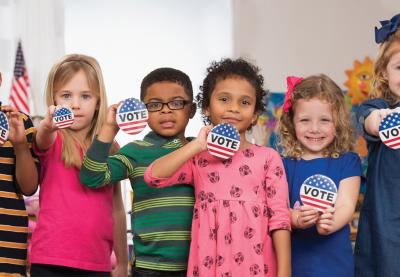In the summer of 2018, TT introduced our first-ever Voting and Democracy Grants. We began accepting applications in May, and from the first round we were amazed by the incredible work educators are doing to encourage students to use their voices and their votes.
In this roundup, we’ve included summaries of some of our favorite Voting and Democracy Grants projects. If you’re inspired by what you read, apply for your own grant here. We’ve extended our deadline to September 15, so you still have time to share your brilliant idea for encouraging students in your classroom, school or district to get involved in their democracy.
Educate, Engage, Empower: The Power of the Vote
Hartford, Connecticut
Even second-graders aren’t too young to learn about voting rights, as our grantee in Hartford, Connecticut, shows. There, students of all ages in schools across the district will engage with democracy through civic literacy lessons. The project begins with 10th-grade civics students. Through interviews, panel discussions, and registration and voter engagement events, high school students will connect with community leaders and stakeholders to learn about the civic rights and responsibilities. And because teaching is one of the best ways to understand a subject, the 10th-graders will also develop lessons for younger students. They’ll focus on civic engagement and help second-grade students see that they, too, have the power to be change makers. This district-level project provides a broad opportunity for student involvement: Our grantee estimates that 800 students will participate in the program.
On the Road to Rock the Vote
Oakland, California
At one Oakland, California, middle school, members of the Girls in Government, Leadership and Service Club will learn about political action while discussing ways to create change in their communities. With help from a TT grant, students will study voter registration policies as well as historical and current tactics of voter suppression. They’ll build an understanding of the fight for voting rights in our country. They’ll also learn the value of those rights, listening to the stories of women such as Rosa Parks and Grace Bell Hardison. The project culminates with a bus tour of nearby high schools to pre-register and register other students to vote. Along the way, the girls will teach others about the significance of registration and the importance of exercising the right to vote.
Voter Registration and Civic Participation
Lafayette, Louisiana
At an independent school in Lafayette, Louisiana, high school students will work with middle schoolers on a project that introduces both age groups to democracy in action. The older students will host a mock voter registration drive and a mock election, offering a lesson to their younger peers on the importance of registering and voting. The younger students will witness a positive model of civic participation, discover the importance of researching candidates and the issues they stand for, and practice voting. This project will affect 550 students in total—the entire student population of this pre-K through 12th grade school will be involved by the end of the year.
Del City Votes!
Del City, Oklahoma
At a middle school in Del City, Oklahoma, students will inspire eligible adults in their town to register and to vote. Through their local and global citizenship classes, and in partnership with their school’s civics action organization, eighth-grade students will explore several strategies, including door-to-door canvassing and face-to-face conversations, to encourage community members to exercise their right to register and vote. The middle school students will hold voter registration drives at their district’s high school football games and other local events. The goal, our grantee explains, is for students to identify as engaged citizens themselves, even as they motivate eligible adults to become prepared and excited to vote.
The Civic Literacy and Organizing Unit
Amherst, Massachusetts
Because students too young to vote often feel excluded from the democratic process, this project aims to help them see their ability to make change in the world. At our grantee’s Amherst, Massachusetts, elementary school, sixth-grade students have already been writing letters about civil issues to government leaders. With the support of a Voting and Democracy Grant, they’ll take their project further. Students will develop concrete plans related to challenges that interest them, develop proposals offering real-world solutions, and pitch these proposals at miniature lobbying meetings with decision-makers. This classroom-level project not only encourages sixth-graders to engage with their studies, it also shows them they have the ability to produce real change in their larger community.
We the People
Columbia, South Carolina
Seventh-graders in our grantee’s Columbia, South Carolina, classroom will organize a mock election for governor, congress and state representatives. In this classroom-level project, students will research and vote for the candidates currently running for office in their state. Leading up to the election, students will create a nonpartisan voter’s guide with helpful information about the candidates and initiatives on this November's ballot. They will compose public service announcements, debuting their work on the school’s morning news show. Before and after the mock election, students will gather data about the voting process, designing pre- and post-election surveys.
We Vote!
Opelousas, Louisiana
Assisted by a TT grant, second-grade students in Opelousas, Louisiana, will discuss the importance of voter registration and voting rights, eventually crafting artwork to encourage voter registration and participation. The students will also travel to Baton Rouge to visit their state capitol building, where they’ll see the state’s seat of government firsthand and learn about the past and the future of their state and its leaders. Following their visit, students will prepare presentations to share with their schoolmates, explaining what they learned on their trip.
Malley is an editorial assistant for Teaching Tolerance.


0 COMMENTS